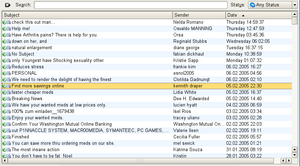Email spam
[7] Now the ban on spam is enforced by the Terms of Service/Acceptable Use Policy (ToS/AUP) of internet service providers (ISPs) and peer pressure."[11] Spam is also a medium for fraudsters to scam users into entering personal information on fake Web sites using emails forged to look like they are from banks or other organizations, such as PayPal.[22][23][24][25] Finally, in most countries specific legislation is in place to make certain forms of spamming a criminal offence, as outlined below: Article 13 of the European Union Directive on Privacy and Electronic Communications (2002/58/EC) provides that the EU member states shall take appropriate measures to ensure that unsolicited communications for the purposes of direct marketing are not allowed either without the consent of the subscribers concerned or in respect of subscribers who do not wish to receive these communications, the choice between these options to be determined by national legislation.[26] In the United Kingdom, for example, unsolicited emails cannot be sent to an individual subscriber unless prior permission has been obtained or unless there is a pre-existing commercial relationship between the parties.[34] Bulk commercial email does not violate CAN-SPAM, provided that it meets certain criteria, such as a truthful subject line, no forged information in the headers.Spammers often use false names, addresses, phone numbers, and other contact information to set up "disposable" accounts at various Internet service providers.Large companies may hire another firm to send their messages so that complaints or blocking of email falls on a third party.To prevent this, some ISPs and domains require the use of SMTP-AUTH, allowing positive identification of the specific account from which an email originates.To counter this, some spammers forge additional delivery headers to make it appear as if the email had previously traversed many legitimate servers.Forward-confirmed reverse DNS must be correctly set for the outgoing mail server and large swaths of IP addresses are blocked, sometimes pre-emptively, to prevent spam.These measures can pose problems for those wanting to run a small email server off an inexpensive domestic connection.The first known spam email, advertising a DEC product presentation, was sent in 1978 by Gary Thuerk to 600 addresses, the total number of users on ARPANET was 2600 at the time though software limitations meant only slightly more than half of the intended recipients actually received it.[53] A 2010 survey of US and European email users showed that 46% of the respondents had opened spam messages, although only 11% had clicked on a link.[54] According to Steve Ballmer in 2004, Microsoft founder Bill Gates receives four million emails per year, most of them spam.[56] At the same time Jef Poskanzer, owner of the domain name acme.com, was receiving over one million spam emails per day.As much as 80% of spam received by Internet users in North America and Europe can be traced to fewer than 200 spammers.][12][61][62][63][64][65][66][67][68][69] When grouped by continents, spam comes mostly from: In terms of number of IP addresses: the Spamhaus Project ranks the top three as the United States, China, and Russia,[70] followed by Japan, Canada, and South Korea.[71] The U.S. Department of Energy Computer Incident Advisory Capability (CIAC) has provided specific countermeasures against email spamming.For example, one company's offer to "[remove] some spamtrap and honeypot addresses" from email lists defeats the ability for those methods to identify spammers.This includes: In order to send spam, spammers need to obtain the email addresses of the intended recipients.A single spam run may target tens of millions of possible addresses – many of which are invalid, malformed, or undeliverable.For instance, a user may decide that all email they receive with the word "Viagra" in the subject line is spam, and instruct their mail program to automatically delete all such messages.A number of DNS blacklists (DNSBLs), including the MAPS RBL, Spamhaus SBL, SORBS and SPEWS, target the providers of spam-support services as well as spammers.

email boxspammingMonty Python sketchcanned pork product Spampostage dueattention theftphishingmalwareattachmentsARPANETsent the first email spam messageTerms of ServiceAcceptable Use PolicyCyberoamfraudstersPayPalEmail appendingImage spampump and dumpCAPTCHAoptical character recognitiondirectory harvest attackdictionary attacksoftware bugsBackscatter (email)virusesbounce messageenvelope senderDNSBLsinternet service providersEmail spam legislation by countrylegal remedytrespass to chattelscomputer crimebotnetsEuropean UnionDirective on Privacy and Electronic CommunicationsFighting Internet and Wireless Spam ActSpam Act 2003penalty unitsCAN-SPAM Act of 2003credit cardspoofingIP address spoofingSMTP-AUTHemail deliveryopen mail relaysproxy serversauthenticationzombiesZombieForward-confirmed reverse DNSMicrosoftSteve BallmerBill GatesJef PoskanzerNorth AmericaEuropeSophosSpamhaus ProjectChinaNetAmazonAirtel IndiaAnti-spam techniquesComputer Incident Advisory Capabilityemail filteringgreylistingspamtrapsproof-of-work systemmicropaymentEmail authenticationEmail address harvestingViagraleetspeakBayesian filteringBayesian poisoningpink contractspamwareCD-ROMsDNS blacklistschain lettersSpamvertisingOpt-in, confirmed opt-in, double opt-in, opt-outironicHistory of email spamAddress mungingBotnetBoulder PledgeChain emailDirect Marketing AssociationsDisposable email addressGordon v. Virtumundo, Inc.Happy99Junk faxList poisoningMake money fastNetiquettenews.admin.net-abuse.emailNigerian spamProject Honey PotShotgun emailSPAMasterpiece TheaterSpamusement!SpambotSpamCopSpamhausSpamtrapSpider trapSPIT (SPam over Internet Telephony)BibcodeCompuServe Inc. v. Cyber Promotions, Inc.School of Visual Arts v. KuprewiczSanford WallacePC WorldPrivacy and Electronic Communications (EC Directive) Regulations 2003Wayback MachineOleg NikolaenkoBrad Templetonguardian.co.ukPegasus MailMercury Mail Transport SystemDavid HarrisUnsolicited digital communicationProtocolsBulk email softwareEmail spoofing